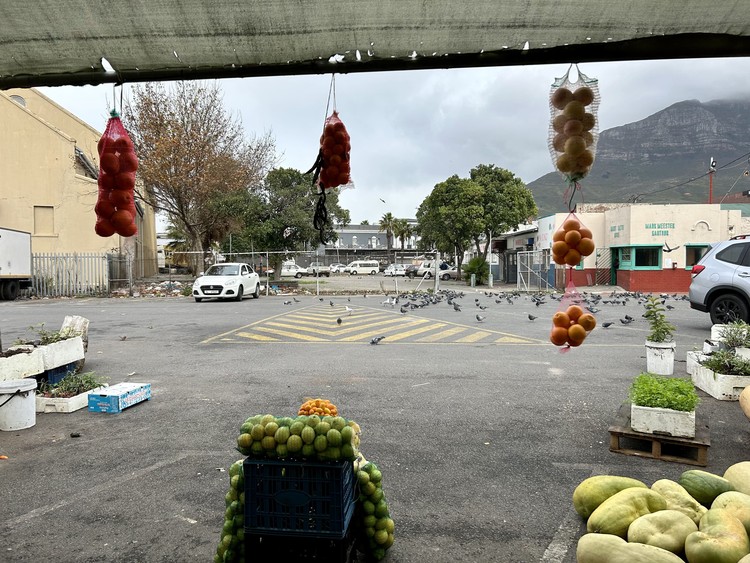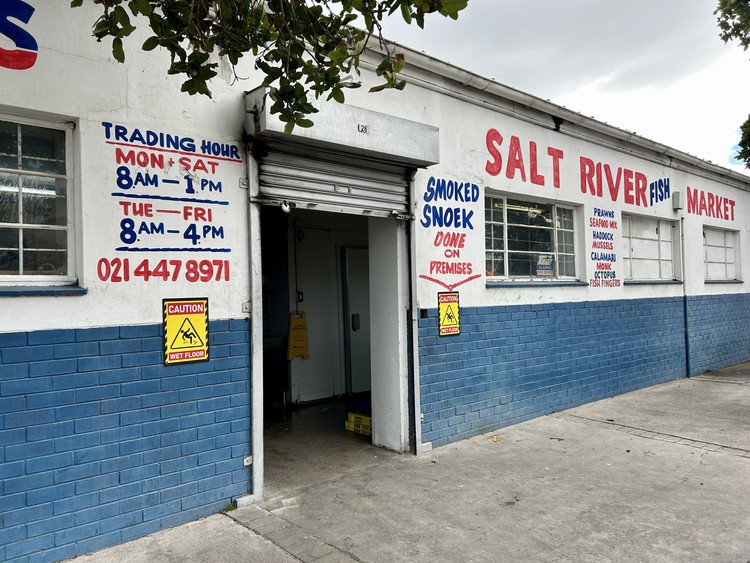Social housing at Salt River Market moves one step forward
Heritage approval granted, but funding is uncertain and informal settlement families still need to be relocated
Four traders remain at the Salt River Market. Heritage Western Cape has recommended they be incorporated into the planned retail space in the new development. Photos: Matthew Hirsch
- Social housing at the Salt River Market has been on the cards for more than a decade.
- There have been land transfer delays, and more hurdles still to cross before construction can begin.
- But the approval of a required Heritage Impact Assessment has moved the development a step forward.
- The heritage authorities recommend the four remaining traders at the market be given retail space in the development.
The development of social housing at Cape Town’s historic Salt River Market is a step closer to fruition after a required Heritage Impact Assessment was approved earlier this month.
The provision of social housing at the site has been planned for more than a decade but has been beset by land transfer delays. A burgeoning informal settlement on part of the land next to the market has created further hurdles.
Social housing institution Communicare has been in discussion with the City of Cape Town, which owned the land, over developing the centrally located 1.7-hectare site since 2014. The land sale agreement was signed by Communicare in 2022, for the building of 300 social housing units and 700 open-market units.
According to the Heritage Impact Assessment, approved by Heritage Western Cape on 11 June, there will be two apartment buildings. The ground floors will be used for retail space. The Salt River Town Hall next to the market will be retained, along with the public plaza used to access the market.
The need for affordable housing in the inner city is pressing. There are more than 400,000 families on Cape Town’s housing waiting list.
City mayco member for human settlements Carl Pophaim previously said construction at Salt River Market would begin in July 2024, but Communicare CEO Anthea Houston says the site is yet to be handed over to them. This is despite the land sale agreement having been signed in 2022.
Families living in an informal settlement next to the market still need to be relocated by the City.
“We are hopeful that this will take place by the end of 2025,” said Houston.
Pophaim told GroundUp the City is in talks with the informal settlement residents and is preparing sites to which they can be relocated. He did not provide a date for when the process will be completed.
Funding bottleneck
Meanwhile, funding for the development has not yet been secured. Social housing developments rely on once-off subsidies from the Social Housing Regulatory Authority (SHRA), usually to cover about half the development costs.
The remainder of the costs need to be privately financed by the developer or from other government grants. Rental payments by tenants are used to recoup development costs and pay for maintenance and other operating costs.
Social housing is regulated by the SHRA and can only be offered to households earning less than R22,000. Rental amounts are set according to household income, capped at R7,326 a month.
Houston said SHRA’s subsidies for the Salt River project have not yet been approved. “The social housing regulator had a long delay in project approvals during the preceding years after their budget had been severely cut. The process of project approvals is back on track, and we anticipate a decision in the coming three months,” she said.
Asked for comment, SHRA spokesperson Lesego Diale said the regulator does not “pre-allocate funding” to projects. She said that information on the SHRA’s pipeline for future projects is confidential.
The Salt River Fish Market, run by Warren du Preez, employs 11 people.
Uncertain future for traders
The Heritage Impact Assessment for the development recommends that long-standing vendors at the market be accommodated in the retail section of the development. This was requested by the Salt River Heritage Society, which made submissions on the heritage impact assessment.
Pophaim previously told GroundUp that only fresh produce vendors will be accommodated in the future development, in line with the market’s heritage as a farmers’ market.
Four traders are still operating. Three sell fresh fruit and vegetables and one sells fish. The other traders, who sold bric-a-brac, building materials, and other goods not in keeping with a farmers’ market, left after being issued eviction notices in 2023.
Fishmonger Warren du Preez, who employs 11 people, stressed that the retail section of the development must be inclusive. “They mustn’t try to compete with the Biscuit Mill … You need to have spaces that are affordable,” he said.
Rumina Adams, who sells fresh vegetables, said she was a third-generation trader. “My grandparents started (it) and my parents have built the business up. We have been here since the market opened.”
She said she would like to have a space in the proposed development to run her business, but she has not received any guarantees from the City.
Rumina’s sister, Zubaida, has a stall next door. She said she needs certainty from the City about their plans. “This is a farmers’ market, we want to just revive it and make it positive so that people know the market is in existence. Instead of going to all these malls … they must come to an original market.”
Fishmonger Warren du Preez says the retail section of the development must be inclusive.
Heritage approval
The Heritage Impact Assessment contains several conditions related to landscaping, engineering, and monitoring for potential archaeological finds during the development. These aspects will need to be addressed before final approval is given.
Salt River Hall and market manager’s office will be retained due to their heritage value. In a separate process, Heritage Western Cape has also recommended the Hall be declared a provincial heritage site.
Heritage Western Cape also recommended that the developer investigate how to meet some of the requests made by the Salt River Heritage Society. These include incorporating three-bedroomed units in the social housing component, providing space next to the community hall for community organisations, and the inclusion of an Early Childhood Development centre.
Support independent journalism
Donate using Payfast

Don't miss out on the latest news
We respect your privacy, and promise we won't spam you.
Next: Court annuls man’s second marriage because his first wife did not consent
Previous: Helping the dogs and cats of De Doorns
© 2025 GroundUp. This article is licensed under a Creative Commons Attribution-NoDerivatives 4.0 International License.
You may republish this article, so long as you credit the authors and GroundUp, and do not change the text. Please include a link back to the original article.
We put an invisible pixel in the article so that we can count traffic to republishers. All analytics tools are solely on our servers. We do not give our logs to any third party. Logs are deleted after two weeks. We do not use any IP address identifying information except to count regional traffic. We are solely interested in counting hits, not tracking users. If you republish, please do not delete the invisible pixel.



